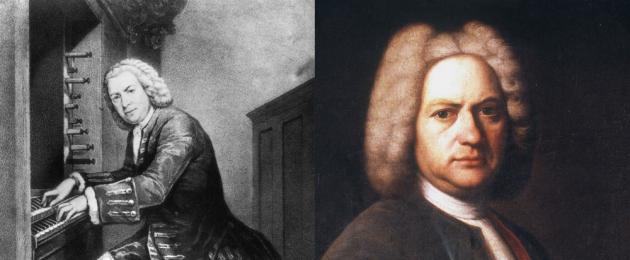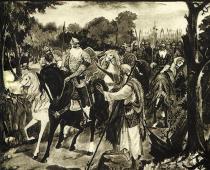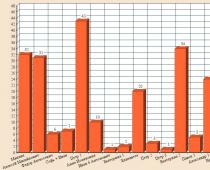Biography and episodes of life Johann Sebastian Bach. When born and died Johann Sebastian Bach, memorable places and dates of important events in his life. Composer and musician quotes, images and videos.
Years of life of Johann Sebastian Bach:
born March 21, 1685, died July 28, 1750
Epitaph
“They say that when Orpheus touched the strings of his lute,
At the sound of it, animals came running from the forest.
But Bach's art is rightfully considered superior,
Because the whole world marveled at him.”
From a poem by the poet Kittel-Mikrander dedicated to Bach
Biography
He was a great composer, a virtuoso musician and a talented teacher, but until the end of his life, Johann Bach believed that his merit lay only in hard work, and his talent belonged to God.
He was born into a wealthy family, his father was responsible for all the musical events of the city. But little Johann's parents died when he was still a child, so the boy was raised by his older brother. Johann studied at the gymnasium, studied music, and then graduated from vocal school. Immediately after school, the young musician received a court position in Weimar, and soon the whole city knew about the wonderful young performer. Bach had no shortage of work - first he worked as an organist in the Church of St. Boniface, then moved to the position of organist in Mühlhausen, where he was highly valued and paid a high salary. But the heyday of Bach's creativity was the period when he returned to Weimar and took the place of court organist, and was also responsible for arranging palace concerts. Bach was given complete freedom in his creativity by the Prince of Anhalt-Keten, who invited the composer to work as his bandmaster. When Bach performed his St. John Passion in one of the main churches in Leipzig, he was appointed chief musical director of all the churches in the city.
It is unknown how many more great works Johann Sebastian Bach would have created, how many more brilliant students he would have given to the world, if not for the illness that tormented him in the last years of his life. In the 1730s, his eyesight began to fail. He continued to write and dictated new works to his students while recording them. Finally, he decided to have an operation, then another, but, alas, none of the surgical interventions could save the composer’s vision. On July 28, 1750, Johann Sebastian Bach died; the cause of Bach’s death was complications after his operations. Bach's funeral was held with great honors. At first, the composer was buried near the Church of St. John, but then Bach’s grave was lost, and years later his remains were found and reburied. During the Second World War the church was destroyed; today Bach's ashes are kept in the Church of St. Thomas, where Bach worked.

Life line
March 21, 1865 Date of birth of Johann Sebastian Bach.
1700-1703 Studying at the St. Michael's Vocal School in Lüneburg.
1703-1707 Work as an organist in the church of Arnstadt.
October 17, 1707 Marriage to Maria Barbara.
1708 Court conductor in Köthen.
1720 Death of Bach's wife, Maria.
December 3, 1721 Marriage to Anna Magdalena Wilke.
1722 Bach's writing of the first volume of The Well-Tempered Clavier.
1723 Church music director in Leipzig.
1724 Bach's writing of the St. John Passion.
1727 Bach's writing of the St. Matthew Passion.
1729 Head of the Music Board.
1744 Release of the second volume of The Well-Tempered Clavier.
July 28, 1750 Bach's date of death.
July 31, 1750 Bach's funeral.
Memorable places
1. St. Thomas Church in Leipzig, where Bach's remains are today.
2. St. Nicholas Church in Leipzig, where Bach first performed his “Christmas Oratorio.”
3. Monument to Bach in Leipzig.
4. Bach House Museum in Eisenach, next to which there is a monument to Bach.
5. Bach House Museum in Leipzig.
6. Leipzig Music School of Johann Sebastian Bach, where the composer served as cantor of the choir.
Episodes of life
Bach's ancestors and descendants were musicians, except Veit Bach, the "founder" of the dynasty. He was a baker, ran a mill, but was very fond of music and played some kind of stringed instrument. But Johann Sebastian Bach’s grandfather, father, grandfather, brothers, children, as well as his grandson and great-grandson were musicians. At the end of his life, Johann Bach said that all his music belongs to God and all his abilities are intended for him.
Johann Sebastian Bach had one quirk. He dressed up as if he were a poor schoolteacher, came to the village church and asked permission to play the organ. When he started playing, everyone present was simply amazed. Some even ran out of the church in fright, believing that an ordinary person could not play like that and that the devil himself was probably sitting at the organ.
Johann Sebastian Bach was modest and did not like praise. One day he played his prelude to the students. When one of them began to admire the teacher’s work and performance, he interrupted him: “There is nothing surprising in this! You just need to know which keys to press and when, and the organ will do the rest.”

Covenant
“I had to work hard. Anyone who is just as hardworking will achieve the same success.”
Biography of Johann Sebastian Bach
Condolences
“Bach is not new, not old, he is something much more - he is eternal.”
Robert Schumann, German composer, music critic
“Not a stream! “The sea should be his name.”
Ludwig van Beethoven, German composer, pianist
- In contact with 0
- Google+ 0
- OK 0
- Facebook 0








